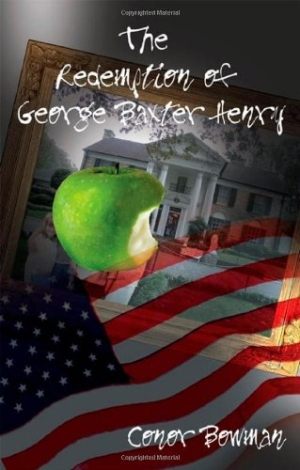The Redemption of George Baxter Henry
The Redemption of George Baxter Henry is a f\#^ing entertaining romp—and if a reader is put off by that description, there’s little chance of enjoying Conor Bowman’s off-handed, tightly structured little book about a middle-aged Irish attorney who takes his family on an extended vacation in France to save his crumbling marriage, his coked-up musician son, and his admittedly half-cocked, selfish sense of himself.
Told in the first person, with a broad-voiced, private-club bluster, the story turns on his wife Pearl’s discovery of his downtown, daytime dalliance, though it’s Muriel, Henry’s mother-in-law, an aloof, nasty nonagenarian and one-time silent film actress, who is the most aggrieved. This is a good thing, though, as Henry’s quick, biting wit and barking no-nonsense style require a worthy foil. Neither Pearl, nor their sweetly sophisticated teenage daughter, nor precocious rock musician, drug-addled son are up to it. When Muriel’s not urging her daughter to divorce Henry, she’s polishing the patina on a much faded Hollywood past. Yet even when she exhausts her vituperative repertoire, or is just plain tired, Henry does an attaboy job of mucking things up all by himself.
Mostly, this has to do with not keeping his pants on, and he knows it, hence the heal-the-homefront trip. But is Henry contrite? Au contraire. He wants to save his marriage (and finances, which a divorce would ruin) and reconnect with Pearl, whom he does love, but not at any price, and definitely not at the cost of turning down the village confection.
Meanwhile, he locks his sniveling son in a stripped, reinforced chateau bedroom in a homegrown attempt at detox, plays boules with a trio of villagers with whom he can’t communicate, admires his daughter’s pluck and common sense, and waits for the perfect moment to settle some scores. All the while, Henry regales with a rambling, wry, and pointed sarcasm; but in many ways, it’s also a compassionate survey about the sorry but human and hopeful state of everything and everyone—himself included.
The son cleans up and signs a record deal, the daughter falls for a French boy. Henry’s wife finds her way back to the marital bed—and into his heart too, the lucky old sod—and he inches nearer the knowledge of how it could have all gone off the narrow rails. Even Muriel, finally dispatched to silence, cooperates in the end; but first, there’s a smidge of blackmail, the bit about being related to Elvis, and a word or two (or a few thousand) about how families persevere.
Reviewed by
Lisa Romeo
Disclosure: This article is not an endorsement, but a review. The publisher of this book provided free copies of the book to have their book reviewed by a professional reviewer. No fee was paid by the publisher for this review. Foreword Reviews only recommends books that we love. Foreword Magazine, Inc. is disclosing this in accordance with the Federal Trade Commission’s 16 CFR, Part 255.

